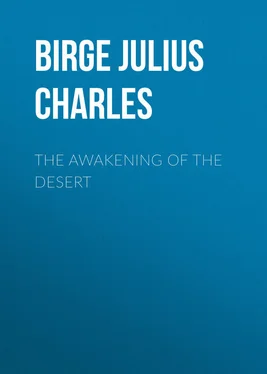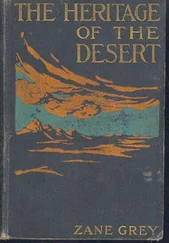Julius Birge - The Awakening of the Desert
Здесь есть возможность читать онлайн «Julius Birge - The Awakening of the Desert» — ознакомительный отрывок электронной книги совершенно бесплатно, а после прочтения отрывка купить полную версию. В некоторых случаях можно слушать аудио, скачать через торрент в формате fb2 и присутствует краткое содержание. Жанр: foreign_language, foreign_antique, foreign_prose, на английском языке. Описание произведения, (предисловие) а так же отзывы посетителей доступны на портале библиотеки ЛибКат.
- Название:The Awakening of the Desert
- Автор:
- Жанр:
- Год:неизвестен
- ISBN:нет данных
- Рейтинг книги:5 / 5. Голосов: 1
-
Избранное:Добавить в избранное
- Отзывы:
-
Ваша оценка:
- 100
- 1
- 2
- 3
- 4
- 5
The Awakening of the Desert: краткое содержание, описание и аннотация
Предлагаем к чтению аннотацию, описание, краткое содержание или предисловие (зависит от того, что написал сам автор книги «The Awakening of the Desert»). Если вы не нашли необходимую информацию о книге — напишите в комментариях, мы постараемся отыскать её.
The Awakening of the Desert — читать онлайн ознакомительный отрывок
Ниже представлен текст книги, разбитый по страницам. Система сохранения места последней прочитанной страницы, позволяет с удобством читать онлайн бесплатно книгу «The Awakening of the Desert», без необходимости каждый раз заново искать на чём Вы остановились. Поставьте закладку, и сможете в любой момент перейти на страницу, на которой закончили чтение.
Интервал:
Закладка:
On the 30th of May, eight days after my arrival at Nebraska City, our train arrived on the opposite side of the river, and I went over to assist in the crossing. The stream had overflowed its banks and night and day on its bosom a mighty drift of logs and trees went sweeping by.
"River, O River, thou roamest free
From the mountain height to the deep blue sea."
There was, however, no tint on the rushing, rolling waters of the chocolate-colored Missouri that could remind one of the ocean blue.
The diary of a journey such as we embarked upon is probably of more interest in those features that deal with early western life under then existing conditions than in geological or archaeological observations. With this idea in mind, I venture to narrate an incident as it was told me on meeting our outfit at the river. The train had come to a halt in the village of Churchville, Iowa. Just before the order to "Roll out," was given, a youth apparently fifteen or sixteen years of age, approached and expressed a desire to see the proprietor of the expedition. Captain Whitmore was indicated as that person. The youth requested permission to accompany the train to Nebraska City, to find an uncle. The Captain cast glances at the boy, whose fine, clear complexion, delicate form, and quiet, unassuming manners indicated that he was probably unaccustomed to a life of exposure and was hardly fitted to enjoy the rough experience of an ox driver. "Young man," said the Captain, "I guess this will be a little too severe for you; I hardly think you will like this kind of travel." On being assured that no fears need be entertained in this matter, but that the boy was not able to pay the high rate of stage fare, the permission was finally granted. The impression really made upon the Captain was similar to that made by Viola on Malvolio, as given in Twelfth Night , where he is made to say:
"Not yet old enough for a man nor young enough for a boy! as a squash is before 'tis a peascod, or a codling when 'tis almost an apple; 'tis with him in standing water between boy and man. He is very well-favored and he speaks very shrewishly."
The boy immediately, as if by instinct or delicacy, took a position in the train with Mrs. Brown, the cook's wife. As an assistant the youth did not assume the fresh manners expected from the average boy who is gifted with attractive features and fine temperament, but rode quietly along from day to day. In the course of time the Captain was led to entertain a suspicion concerning the youngster, which was finally embodied in a question concerning his sex. Without hesitation the boy frankly admitted that he was a girl. Being exposed so suddenly and among so large a number of men, she burst into tears, a very natural mode of expression among women.
Her story was short. It was a story of wrongs suffered at the hands of a step-father, and of desire to find an uncle in the West, which she had taken this method of accomplishing. "But where's her hame and what's her name, she didna choose to tell." She admitted having her proper apparel in her satchel, which was substituted for her male attire in the house of a farmer nearby. She then returned to the train and finished her journey, keeping herself in close company with Mrs. Brown. I saw the young woman soon after meeting the train. She was certainly a handsome, refined, modest-looking village girl, not more than nineteen years of age. We may catch another glimpse of the young girl's life later.
There have been but few writers who have laid the scenes of their romances in the far West, but there are numerous bits of history, supplied by the social life of the pioneers, like this truthfully-related incident, which the pen of a ready writer might turn into a tale as beautiful and interesting as that of Viola, who in the role of page enacted her part and "never told her love."
On Saturday, June 2nd, additional crowds of people were attracted to the town by its first election, at which an opportunity was offered the people of the territory to vote upon the question of "State or no State." We learned later, that the vote of the people as might have been expected was in the affirmative, but on President Johnson's failing to approve the measure, statehood was for a time denied them.
Our train passed on through Nebraska City and camped six miles westward. We discovered later that the congestion of travel on the one thoroughfare of the town was really the result of the lack of business. The amount of freight to be moved from the river towns was less than had been expected, and the shippers being unwilling to pay the rates that had prevailed in former years, the freighters were refusing to carry the merchandise and were lingering in the towns expecting better prices.
In the course of a few days some expected friends arrived from Wisconsin with special merchandise and horse teams, and without waiting for the ox train, it was decided that a few from our party should separate from the others and with horse teams proceed westward at once. Negotiations with reference to a common interest in the mercantile venture were finally perfected. We purchased the supplies of provisions for our journey, and after supper, on June 8th, pulled out five miles from the town to our first Nebraskan camp. The sun had hardly set, closing the long June day, when our party, now brought together for the first time on this expedition, found its members all rounded on the grass in a prairie valley and half reclining upon boxes and bags, discussing the future.
There was Peter Wintermute, a powerful, athletic young man; he was six feet and three inches in height, and his long legs were stretched out upon the grass. He was an experienced horseman, and had a team of four fine animals with a modest wagon load of merchandise of some value, which it was proposed to retail somewhere in the West. Paul Beemer, his wagon companion, interested in the venture, was a small, nervous, untiring fellow, and a fine shot with a rifle. This Peter and Paul had few of the characteristics of the Apostles whose names they bore. It is written of Peter, the Disciple, that on one occasion he swore and repented. I fail to recall the occasion when our Peter did not swear – and that is only one of many points of dissimilarity.
In the circle sat Daniel Trippe, another giant in strength and activity, cultured and well informed on current and general topics, a man of fine presence and wonderfully attractive in manner and appearance. Noah Gillespie was financially interested with Dan in a proposed manufacturing project in Idaho. Our Daniel, like his great prototype, was something of a prophet and seer, indeed also something of a philosopher, and his pronouncements were frequently invited. The similarity between our Noah and the great navigator of diluvian days lay chiefly in the fact that Gillespie also had met with much success in navigation – while propelling a canoe in duck hunting on the Wisconsin lakes. Moreover, so far as reported, the patriarch drank too much wine on but one occasion, whereas our Noah excelled greatly in tarrying too often at the wine cup; but he was a good fellow and a valuable companion in time of peril. Noah and Dan had a fine team.
A grand old man was Deacon Simeon E. Cobb, who now sat in the circle upon an empty cracker box, which he frequently used throughout the trip. He was trying the life on the plains in the hope of relieving himself of dyspepsia. He had a team and a light wagon with personal supplies, including a small tent. Henry Rundle and Aleck Freeman were also in the circle. They were vigorous, hardy and reliable men and they too had a team. The especial companions of the writer were Ben Frees and Fred Day. Ben was a compactly-built fellow of elephantine strength, and although only twenty years of age, had been a first-lieutenant in a Wisconsin regiment before Richmond at the surrender. Fred, who was still younger, was delicate but vivacious and buoyant and abounded in all those qualities that make for good fellowship.
Читать дальшеИнтервал:
Закладка:
Похожие книги на «The Awakening of the Desert»
Представляем Вашему вниманию похожие книги на «The Awakening of the Desert» списком для выбора. Мы отобрали схожую по названию и смыслу литературу в надежде предоставить читателям больше вариантов отыскать новые, интересные, ещё непрочитанные произведения.
Обсуждение, отзывы о книге «The Awakening of the Desert» и просто собственные мнения читателей. Оставьте ваши комментарии, напишите, что Вы думаете о произведении, его смысле или главных героях. Укажите что конкретно понравилось, а что нет, и почему Вы так считаете.











